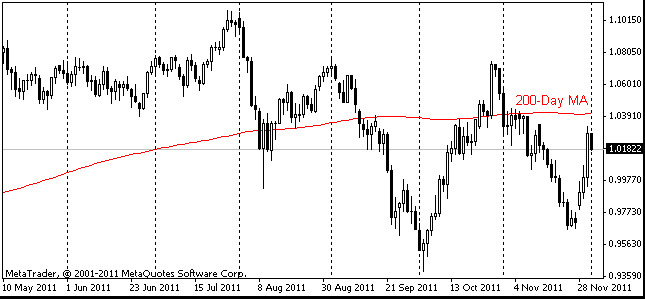EUR/usd
The week began with quite an optimistic growth in global stock markets and strengthening of risk-sensitive currencies. The euro didn't stand aside either, having risen up to 1.3230 at the opening. The euro is growing as, fortunately, over the weekend there haven't appeared any factors that could prevent or postpone the Greek deal. The decision on another 130 bln aid package to Greece is to be taken today. The confidence of markets has increased after Merkel made it clear that the finance ministers are prepared to support the allocation of funds to Greece. This would be a logical step since the country adopted the required cost-saving measures at the legislative level. But, as we know, the issue with Greece consists in the very implementation of the adopted laws. It is a problem because, first, Greece has poor fiscal management and a large share of shadow economy and, secondly, the country suffers a sharp economic slowdown because of fierce austerity measures and investment outflow. And all that is the result of uncertainty around the country. Friday's U.S. statistics showed a bit weaker monthly rise in prices (0.2% vs. 0.3%), but a higher annual growth rate (2.9% vs. 2.8%) than expected. The U.S. CPI has been slowing down since September – it has fallen from 3.9% over that time. Core inflation, on the contrary, is gathering pace. In January it made 2.3%, a year ago it was 1.0%, and in October 2010 it totaled just 0.6%. If the Fed paid as much attention to inflation as before, it wouldn't be preparing to further ease the monetary policy, but would be looking to raise the rates. Have times changed? Today is President's Day in the U.S., so there won't be large trade volumes in the afternoon.

GBP/USD
The British pound displays a very good reaction to the statistics. In this sense it may be called the most convenient currency to trade on the news (or inconvenient, if you've got the opposite viewpoint). Friday's data on retail sales proved to be perfect. Instead of the expected 0.3% decline there was recorded a 0.9% increase. It's quite a considerable figure which suggests a 2.0% growth against January 2011. That is how the British reacted to retailers' discounts. The good point of such data is that they are measured in the volume of sold goods, not money, as is usually the case with the U.S. statistics. In other words, it is the real growth by 2%, which is undoubtedly good news. Today's data also show a stronger consumer spending than expected before. House price index from Rightmove has risen by 4.1% this month. A year ago the February increase was also strong, but made just 3.1%. However, year-on- year prices have added only 1.4%. With the increasing demand for risk the sterling is heading for the 200-day moving average (1.5915) and has good chances to break it up.

USD/JPY
The Japanese yen was declining on Friday afternoon and keeps falling today against the majority of currencies. USD / JPY has reached 79.88, the highest level since last August. However, the steady growth of the pair (which goes along with strengthening of the country's stock indices) has been prevented by the data on trade balance. January is traditionally the worst month for the Japanese trade, but this time the monthly trade deficit turned out to be record, having made almost 19 billion dollars. Such poor data clearly indicate that the passiveness of the country's officials has a pernicious effect on the economy. However, unlike Switzerland they do not have an opportunity to peg the rate. Japan is a very large economy (the 3-d largest), so such steps would incur the USA's, China's and probably some other countries' anger and sanctions on Japan.

AUD/USD
Bidding on the aussie opened with a positive gap. From the closing level near 1.07 the pair is now trading at 1.0770, and the high was recorded at 1.0815. It should be noted that this high is lower than the ones at the beginning of the month when the pair rose to 1.0845. Consolidation after the impressive rally still holds. Interestingly, the Australian stock markets have shown a sharp growth today. This happened not only due to the improved sentiments in regard to Greece, but also due to the reduction of the reserve requirements for banks from 21% to 20.5%, which should support lending and strengthen the output growth.
